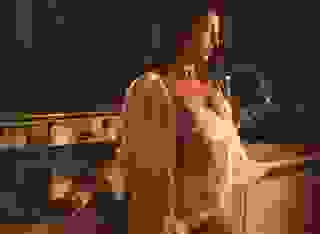- Erotic Horror
- Devil Box
Note: You can change font size, font face, and turn on dark mode by clicking the "A" icon tab in the Story Info Box.
You can temporarily switch back to a Classic Literotica® experience during our ongoing public Beta testing. Please consider leaving feedback on issues you experience or suggest improvements.
Click here"'I love you' is the inscription on Pandora's box."
-Mason Cooley
***
The first thing that surprised Taph about her buyer was how little he actually seemed to care about the box now that it was finally his.
In fact, when she put the canvas bag holding it on the table he leaned back, like he'd caught a whiff of something unpleasant—so far back that briefly he took himself out of the dim pool of light over their booth in the bar, leaving his face a shadow mask and his expression a mystery.
He was a young man, probably about Taph's age, dark and curly haired and dressed in expensive clothes, but in a sloppy way that showed he wasn't used to them. His name was John Weyer. It had taken him almost a week to talk Taph into coming to meet him here, and now that she finally had he looked as if he was in the last place he wanted to be in the whole world.
It was late, but the bar was mostly empty. It was neither ritzy enough to impress the moneyed crowd nor dumpy enough for those who enjoyed dives—a middle-strata kind of place that stayed in business by catering to crowds that couldn't get in anywhere else. Weyer apparently owned it.
Taph often drank, but she never went to bars anymore. Still, she knew what things were worth, and she sized the place up almost immediately. Weyer, on the other hand, proved harder to place.
Most of the auction items she'd sent to their respective buyers via courier. Others, international mail. This was the only delivery Taph was making in person, and only because Weyer offered a lot of money on top of his bid if she agreed to bring the box to him herself. Enough money to override her better judgment, at least for an hour.
She assumed that if a man insisted on meeting her it was because he wanted to make a pass, and everything about the setup—the bar, Weyer's clothes, and his apparent anxiety included—said she was right. But no, she quickly realized, he had something else on his mind, although just what she couldn't say. Intrigued, she sipped her drink and let him do the talking.
The crescents of Weyer's fingernails matched the shining ice cubes in his glass. He cleared his throat and said, "So that's it?" His real voice sounded exactly like his phone voice, and older than he appeared to really be.
"That's it," Taph said, patting the sack. "Want to see it?"
"No," said Weyer, sliding back in his seat again.
"You should really inspect the merchandise," Taph said, pausing to take such a minuscule sip from her drink that its level barely changed at all. "How do you know I brought you the real thing?"
"I know," was all Weyer said. And then, suddenly: "Do you know what it is?"
"The auction catalog included all of its specs," Taph said.
"Yes," said Weyer, not fooled, "I read them. But I'm asking you: Do you know what it is?"
Shrugging, Taph said, "Up until now, it's been a problem. Now it's your problem—or it will be as soon as we're done here. And before we say anything else, you really do need to look at it."
Before he could stop her, she took the box out of the bag. It was a little less than a foot to each side, made of aged brass, and the lid was sealed up all the way around with some old gunk that looked like wax but smelled faintly of other things--sulphur, and asafetida.
Scratched into the lid was an archaic design, a circle enclosing a sequence of lines—but it was impossible to make out in detail, so old was the material. There was no lock or latch, and as far as she could tell no way to open it.
That's all it was: a box that wouldn't open, no matter how hard Taph had tried. Whatever was inside it wasn't particularly heavy--Taph even wondered if maybe it was empty. But obviously whoever had closed it had wanted to make sure it stayed that way.
It was basically trash—only its obvious age convinced her to bother looking for a buyer at all, imagining that maybe the craftsmanship was valuable on its own. Weyer's top-dollar purchase had astonished her. Now she tapped the beaten brass lid with the tip of a fingernail for emphasis.
"Satisfied?" she said.
"It's the real thing, if that's what you're asking me," said Weyer.
"Mm. You want me to put it away?"
"Please."
She put the box on the seat next to her, under the lip of the table. Once it was out of sight, Weyer appeared almost animated by its absence.
"It was your father's?" he said after a moment.
"Yes."
"You didn't get along with your father." Weyer said.
The hairs stood up on the back of Taph's neck. "Who told you that?"
"Nobody, I just noticed the way you talk about his things. Most people are very sentimental about a late parent's possessions." He prodded an ice cube in his glass with the tip of one finger.
"Dad had particular ideas about my life. I did love him," she added, hoping that it didn't sound too defensive. "But we grew into very different people. Black and white opposites, actually."
"And when he died he left you with a material burden. People spend their entire lives accumulating things and then they all just become a problem for someone else. What do you do, if you don't mind me asking?"
"I'm in networking. I help people meet the right people. But between you and me, what I'd really like is to start a family."
"What's stopping you?"
"Gotta meet the right person first."
Even though the box was out of sight, it still encroached on their conversation. Taph even imagined herself pausing in the middle of the conversation to see if it had anything to add, and had to labor to keep from laughing out loud at the idea.
Of all the things in her father's collection, the box was the one she thought she'd have the hardest time selling. After he died, Taph had been amazed and dismayed to discover that she'd inherited everything from Dad, whole rooms full of antique nonsense that he'd compiled over decades upon decades: knives, swords, staffs, animal skins, weird clothes, headdresses, rings, incense, perfume, books and loose pages in languages nobody knew, sealed jars and little bottles full of who knows what, and even stranger things that defied easy descriptions.
Much of it she'd seen before, of course, as he built the collection over her entire life, first out of pieces from his antiques business and then, later, as a regular customer of younger dealers now running similar businesses of their own.
Taph had chided him about wasting his money—one of the many things they fought about in his later years. He always said he didn't expect her to understand, and on that much at least they agreed, as she never had.
Not until the collection was hers did she realize just how big it really was—and how strange. So many things he'd never hinted at: bronze tripods, mummified hands, things preserved in jars and in wax, fossils and bones—weird shit.
After a while she'd begun resenting Dad's Weird Shit Room and its presence in her life, much the same way she'd resented him. But at least the Weird Shit did prove useful in the end; when she'd put a few of the showier items up in a blind auction, all of them sold for tidy sums. The auction house asked her for more, and when she provided more it all sold too.
Eventually she cut out the middleman and began running auctions herself. She imagined her customers must be incredible suckers, but they were suckers with money. Dad had been dead a year now, and most of his stuff was gone. Taph hung onto a few items in the collection that appealed to her. Everything else sold.
The box was the last of it, and Weyer had been her only bidder. He struck her as maybe a young Silicon Valley type, only recently rich and not acquainted with either money or other people. He'd asked to meet at his bar not to show off that he owned it, she realized, but because it was a place he was already familiar with, a home field where he didn't have to worry about any extra variables.
As if reading her mind, he talked about the bar a bit. "I have no business partners, and no debts on the place. It was bleeding cash when I first took it over, but these days it's doing well." He was talking about business not to brag because that also made him comfortable, a topic he could speak on with confidence to mask his anxiety.
"That's great," Taph said, not even bothering to hide her disinterest. "Now about the item—"
"This is about the item," Weyer continued. "I'm saying this place is an asset, and it's good value. If you wanted, I could give it to you—or someplace just like it. I'd sign the whole thing over, business and building, just say the word."
Taph waited for the punchline. It didn't come. Trying hard not to bat an eye she said, "Why would you do that? You've already paid me what you owe, for the item and for delivery. And I'm not interested in owning a bar."
"What would interest you: stocks? Patents? More antiques? I know every dealer, if there's something you've been looking for?"
"All I'm looking is for you to take your shit and go," Taph said.
But she didn't mean it—not entirely. John Weyer was freaking her out, but he was also making her curious. If this was a come-on it was the damn strangest one in history. If it wasn't, then she couldn't imagine what he was up to.
He scooted around the perimeter of the table, closer to her; she realized he was trying to get close enough to lower his voice without leaning over and getting closer to the sack and its contents. Intrigued, she leaned closer to accommodate him.
"I paid to buy the box, and now I've paid you to bring it here. So now that's done."
"Get on with it," Taph said. She'd begun drinking faster in response to his dawdling, as if she could somehow speed up time this way.
"I'm proposing a third transaction: Now, tonight, I'll pay you just as much as I did to buy the box, as long as you agree—"
He paused and picked his dry lips, and Taph could not shake the feeling he was doing it entirely for dramatic effect.
Finally he spit out: "To destroy it. As soon as possible. In exactly the way I tell you to, with no questions asked."
Taph blinked again. Weyer stared at her with deadly earnestness, his light brown eyes giving away nothing.
"I'm sorry, I must not have heard you right over the music," she said, swallowing the rest of her wine in one go. "Did you say—"
"Destroy the box. Say you'll do it, and I'll pay you tonight, in cash. Or do you want the bar after all? It's yours—but only if we do this."
"Destroy the box?" Taph repeated, as if trying the phrase out.
"I said no questions asked."
"Well I'm sorry, but I DO have questions. You paid for this—"
"And now I'll pay it again to be rid of it."
"You don't need me for something like that. Throw it off the bridge on your way home."
"Then it would just be lost," Weyer said. "Not destroyed."
"So chuck it in the furnace. Run it over. Hell, you can get creative with this, make a fun weekend project or something. You don't need me." Grabbing her purse, Taph half rose out of the booth, suddenly eager to be out of whatever this was. Only the look in Weyer's eyes—alarmed, vulnerable, pleading—stopped her.
"That wouldn't work either," he said. "I realize how this must sound, but there are very particular things that have to be done for this. If it's not done just the right way...well, it NEEDS to be done the right way. Surely you can understand that at least?"
Very slowly, Taph sat again, though she kept her purse in hand and one foot outside the booth. "Okay. So it has to be done some special way. Why can't you do it?"
"It's complicated."
"Try me."
"Miss...I'm sorry, I just realized I actually don't know your full name?"
"That's on purpose. You really don't want to tell me what this is all about, do you?" Her mind racing, Taph made every kind of calculation she could on the spot. "And you swear you're good for the money?"
"Every penny, you know I am."
"I guess I do. Okay. You've got a deal."
He began to smile, the first time she'd seen him look anything but worried. She quashed it immediately.
"IF...you answer one more question," she said.
And this time it was her turn to lean in, so close that they were almost huddled together in the corner booth, under the dim yellow sodium lights of the bar.
"Tell me what's in it," she said.
The color left Weyer's face. Taph had never actually seen that happen to anyone before, and she found it more unnerving than she'd have thought.
"Absolutely not," he said, sounding stalwart all of a sudden. "Out of the question."
"Okay. But no answers, no deal."
She watched him scramble in his mind. Finding no reply, he could only put up one hand, as if that alone would stop her. When Taph stood this time, she knew she really was leaving.
"I'm sorry we couldn't work out another exchange. In the meantime, Mr. Weyer, the box is all yours...except you don't want it, do you?"
Weyer looked defeated, almost sullen, like a child. Not making eye contact, he shook his head.
"I'll take it with me then," said Taph, picking it up off the table. It felt heavier now somehow. "For safekeeping. It's yours the moment you tell me you want it—or if you ever want to tell me the truth about it, I'll get rid of it however you please. Those are the terms. Think it over and get back to me."
"You don't really want to know," Weyer said. "If I told you, you'd do anything to not know anymore."
"I guess we'll never find out now," said Taph. And, tucking the box under her arm, she left before he could reply.
Outside, the night air chilled the sweat on her skin, and she only then realized how heavily she'd perspired. The meeting had lasted less than 30 minutes, but it felt like she'd been in that little middle-of-the-road bar all night.
She called a car, and when it came she sat in the backseat. The box was in her lap. She stared at it the entire ride home. Just junk, she thought, a waste of time. But apparently not so to everyone.
For the millionth time since she got it, she pressed her fingers up on the lid, trying to pry the box open. As usual, it was no good. But she didn't stop trying the entire trip home.
***
He held out longer than she would have expected; almost three weeks. When Weyer finally broke down and called her again, it wasn't to a bar this time but a hotel.
Not up to his room; she wouldn't have been caught dead. Instead they met on an elaborate rooftop patio atop the 33rd floor, accessible by a glass elevator that gave soaring views of downtown. It was pretty impressive, she admitted—but Weyer didn't want to impress her, or else they'd have met here the first time.
The hotel was a real five-star affair. Most of the places around here were classical buildings that marketed their history and atmosphere, but this one was young, new, and brash, the architecture almost brutalist in its disregard for convention.
The roof patio was a solid slab of showy luxury, with black marble flooring and gurgling fountains and a full bar with hundreds of bottles lit from the back like jewels, each of them at least as expensive as a night in one of the better suites. It was a cold evening, but a gauntlet of high-tech heating lamps cast orange halos across the veranda.
It was completely empty except for Weyer, who was already well into his drink when she arrived (not the first one of the night, by the looks of it) and sitting near the placid black mirror of a reflecting pool. His body language was strange—one part marionette off its strings, one part junior high kid stood up by his formal date.
Taph felt curiously overdressed on seeing him—he did not appear to have put any particular effort into presentation, despite the five-star surroundings. On some level Taph felt annoyed—or disappointed? She made a mental note to adjust her expectations downward for the future, then set her bag next to him and slid down onto the bench without announcement.
"Got one of those for me?" she said.
"I assumed you'd want to pour your own," Weyer responded immediately. In a snap, Taph went back to her feet.
"Don't mind if I do."
Looking over the veritable king's storeroom behind the bar, she weighed each bottle's merits in her mind—and also tried to spot if any had been tampered with. People do crazy things when this much money is involved, especially men.
But he'd have no way of knowing which bottle she'd pick, and he couldn't afford to mess with all of them. Even his wealth had to have limits.
Fixing herself a gin on ice, she sipped and let the expensive liquor pool on her tongue. It was cold all the way down.When she returned to her seat Weyer said, "You know your way around a bar."
"I worked my way through college."
"Your father didn't pay your way? He was rich enough—or should have been. I looked him up, he was very respected as a dealer."
"Dad paid for everything; wouldn't have taken no for an answer. But I liked working anyway. Making money of my own mattered. You should never be dependent on just one person in life, no matter what."
"Always the bottom line with you."
"I know what things are worth—including myself." She paused. "Except maybe this place. This one is out of my usual income bracket. You own this too?"
"Not exclusively, I have partners."
"So you can't offer it to me."
"I can offer my shares—it'd be worth far more than any deal you've ever made before." As usual, he wasn't bragging—saying it actually made him nervous, she saw. He didn't like exposing this much about himself. "But you wouldn't take it," he continued.
"Nope."
"Because the fact that I made the offer tells you that what you have is worth much more."
"Now you're learning," she said, and after another cold sip of her drink she leaned back, crossed her legs, and looked out over the edge of the roof. The city in front of them was all dark glass, reflected lights, and the faraway lullaby of wind off the coast. "This really is a nice place though."
"We let it out for private galas. Tonight the schedule was empty, so I thought it's a good place to meet. Private."
"You're a man who likes his privacy," she said.
"'Solitude' is the word I would use."
"Just what is it that you do to make all of this money?"
"Isn't it obvious? I own things." With anyone else this would almost have sounded like a joke, but to Weyer humor seemed like an entirely foreign language.
"How'd you get your start then?"
"Family money."
Taph didn't believe that either; Weyer had "self-made" practically stamped on his forehead. But he wasn't lying, she sensed. It was just a complicated answer. Curiouser and curiouser. Shrugging it off, she commented on the views again.
"You like heights then?" he said, looking out.
"As much as the next person."
"I like being up here, but I can't get much closer to the edge than this. People usually like to walk right up and get the full view, but I can't bear it."
"The ocean."
"Hmm?" he said. He had been looking out with something like reverie, but now his eyes slid back to her.
"That's my phobia: I don't like deep water. Not being able to see to the bottom—can't trust it. But heights never bothered me."
"Not being able to see the bottom—yes, I imagine. Whereas I hate seeing all the way down. I feel like I'm falling. That's the one thing I can't stand."
"Afraid of being knocked off your perch?"
"I just remember what it's like too well. I'm sorry, you're wondering why you're here?"
"Not really," she said. "You made it pretty obvious on the phone."
"You brought the box?"
"You didn't tell me to."
"Even so, you brought it."
With a pause for suspense, Taph reached into her side bag and pulled out the relic. Not bothering to offer it to him again, she set it on her lap, drumming her fingers on the lid. Dad would have lost his mind if he saw such casual handling of an artifact.
Weyer just looked at it as if it were an unwelcome party guest. To her surprise, he reached for it, and she passed it to him without hesitation—it was his, after all. She saw him testing its weight in his hands; it was reasonably heavy itself, but at the same time seemingly empty.








